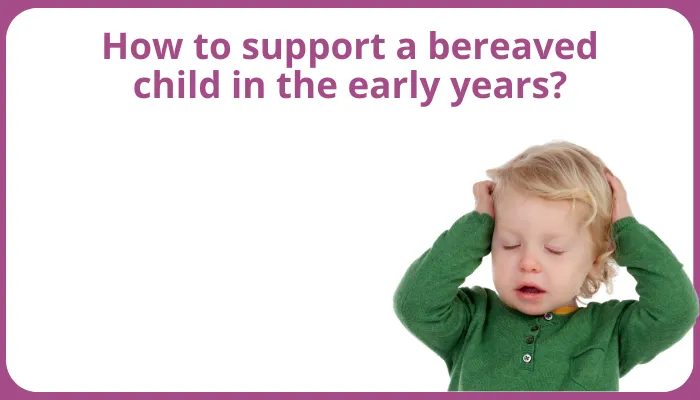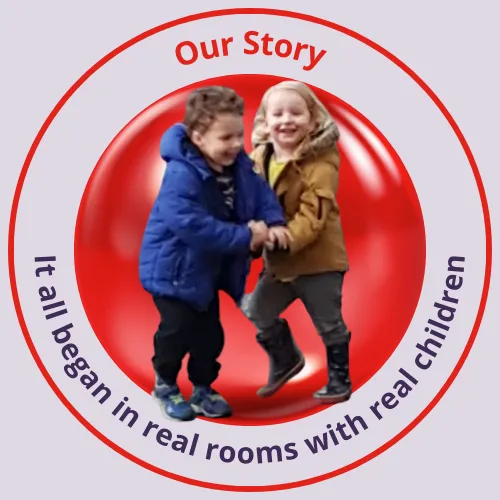Every child's well-being matters.
Well-being Articles

Supporting a Bereaved Child in the Early Years
Bereavement can be a confusing and distressing experience for young children. In early years settings, practitioners play a crucial role in providing stability, comfort, and reassurance to children who have experienced loss. While young children may not fully understand the concept of death, they can sense changes in their environment and the emotions of those around them. Supporting bereaved children with sensitivity and care is essential to their emotional well-being.
How Do Young Children Experience Grief?
Children in the early years may not have the words to express their emotions, but they will show signs of grief in different ways:
Changes in behaviour – Some children may become withdrawn, while others may display challenging behaviour.
Regression – A previously toilet-trained child may start having accidents, or they may seek extra reassurance from adults.
Separation anxiety – Children may struggle with goodbyes or become more clingy.
Play-based processing – They may act out themes of loss and return in their play.
Questions and confusion – Young children may repeatedly ask where the person has gone or when they are coming back.
How Can Early Years Practitioners Support Bereaved Children?
Providing a safe and nurturing environment can help children feel secure as they navigate their emotions. Key strategies include:
Acknowledge their feelings – Let the child know that it is okay to feel sad, angry, or confused. Use simple, clear language such as, "I can see that you’re feeling sad. It’s okay to miss someone when they are not here."
Provide consistency and routine – Stability is essential during times of loss. Keeping to familiar routines can help children feel safe and reassured.
Use age-appropriate language – Avoid euphemisms such as "gone to sleep" or "lost," as these can cause confusion. Instead, use clear terms like "When someone dies, they don’t come back, but we can still remember them."
Encourage expression – Offer creative outlets such as drawing, storytelling, or role-play to help children process their emotions.
Listen and answer questions honestly – Be patient when children ask repetitive or difficult questions. Answer truthfully but in a way that matches their level of understanding.
Working with Families and Outside Support
Communicate with parents/carers – Work closely with the family to understand how the child is coping and what support is needed.
Signpost to additional support – Some families may benefit from bereavement charities such as Winston’s Wish or Child Bereavement UK.
Train staff in bereavement support – Ensure staff feel confident in recognising signs of grief and responding appropriately.
The Importance of a Supportive Environment
Early years settings should foster an atmosphere where emotions are validated, and children feel safe to express themselves. By offering compassionate support, practitioners can help bereaved children navigate their feelings and develop resilience in the face of loss.
AUTHOR:- Iona has nearly 10 years of experience supporting nurseries and childminders in curriculum planning, leadership, and safeguarding. Her writing is informed by public information and sector insight, aiming to provide accessible, practical support for professionals working with children. She is part of the On the Button team, helping deliver Well-being, Safeguarding and Complaint Management Software that empowers practitioners to identify concerns early and act confidently.
On the Button provides innovative software tailored to the needs of the early years sector, with a strong focus on EYFS well-being and early years safeguarding. Our tools help senior practitioners to confidently track concerns, maintain robust records, and respond effectively — all while meeting statutory guidance. From early years complaint management to team-wide safeguarding alerts, our platform puts children's safety and emotional health first.

Supporting a Bereaved Child in the Early Years
Bereavement can be a confusing and distressing experience for young children. In early years settings, practitioners play a crucial role in providing stability, comfort, and reassurance to children who have experienced loss. While young children may not fully understand the concept of death, they can sense changes in their environment and the emotions of those around them. Supporting bereaved children with sensitivity and care is essential to their emotional well-being.
How Do Young Children Experience Grief?
Children in the early years may not have the words to express their emotions, but they will show signs of grief in different ways:
Changes in behaviour – Some children may become withdrawn, while others may display challenging behaviour.
Regression – A previously toilet-trained child may start having accidents, or they may seek extra reassurance from adults.
Separation anxiety – Children may struggle with goodbyes or become more clingy.
Play-based processing – They may act out themes of loss and return in their play.
Questions and confusion – Young children may repeatedly ask where the person has gone or when they are coming back.
How Can Early Years Practitioners Support Bereaved Children?
Providing a safe and nurturing environment can help children feel secure as they navigate their emotions. Key strategies include:
Acknowledge their feelings – Let the child know that it is okay to feel sad, angry, or confused. Use simple, clear language such as, "I can see that you’re feeling sad. It’s okay to miss someone when they are not here."
Provide consistency and routine – Stability is essential during times of loss. Keeping to familiar routines can help children feel safe and reassured.
Use age-appropriate language – Avoid euphemisms such as "gone to sleep" or "lost," as these can cause confusion. Instead, use clear terms like "When someone dies, they don’t come back, but we can still remember them."
Encourage expression – Offer creative outlets such as drawing, storytelling, or role-play to help children process their emotions.
Listen and answer questions honestly – Be patient when children ask repetitive or difficult questions. Answer truthfully but in a way that matches their level of understanding.
Working with Families and Outside Support
Communicate with parents/carers – Work closely with the family to understand how the child is coping and what support is needed.
Signpost to additional support – Some families may benefit from bereavement charities such as Winston’s Wish or Child Bereavement UK.
Train staff in bereavement support – Ensure staff feel confident in recognising signs of grief and responding appropriately.
The Importance of a Supportive Environment
Early years settings should foster an atmosphere where emotions are validated, and children feel safe to express themselves. By offering compassionate support, practitioners can help bereaved children navigate their feelings and develop resilience in the face of loss.
AUTHOR:- Iona has nearly 10 years of experience supporting nurseries and childminders in curriculum planning, leadership, and safeguarding. Her writing is informed by public information and sector insight, aiming to provide accessible, practical support for professionals working with children. She is part of the On the Button team, helping deliver Well-being, Safeguarding and Complaint Management Software that empowers practitioners to identify concerns early and act confidently.
On the Button provides innovative software tailored to the needs of the early years sector, with a strong focus on EYFS well-being and early years safeguarding. Our tools help senior practitioners to confidently track concerns, maintain robust records, and respond effectively — all while meeting statutory guidance. From early years complaint management to team-wide safeguarding alerts, our platform puts children's safety and emotional health first.

Supporting a Bereaved Child in the Early Years
Bereavement can be a confusing and distressing experience for young children. In early years settings, practitioners play a crucial role in providing stability, comfort, and reassurance to children who have experienced loss. While young children may not fully understand the concept of death, they can sense changes in their environment and the emotions of those around them. Supporting bereaved children with sensitivity and care is essential to their emotional well-being.
How Do Young Children Experience Grief?
Children in the early years may not have the words to express their emotions, but they will show signs of grief in different ways:
Changes in behaviour – Some children may become withdrawn, while others may display challenging behaviour.
Regression – A previously toilet-trained child may start having accidents, or they may seek extra reassurance from adults.
Separation anxiety – Children may struggle with goodbyes or become more clingy.
Play-based processing – They may act out themes of loss and return in their play.
Questions and confusion – Young children may repeatedly ask where the person has gone or when they are coming back.
How Can Early Years Practitioners Support Bereaved Children?
Providing a safe and nurturing environment can help children feel secure as they navigate their emotions. Key strategies include:
Acknowledge their feelings – Let the child know that it is okay to feel sad, angry, or confused. Use simple, clear language such as, "I can see that you’re feeling sad. It’s okay to miss someone when they are not here."
Provide consistency and routine – Stability is essential during times of loss. Keeping to familiar routines can help children feel safe and reassured.
Use age-appropriate language – Avoid euphemisms such as "gone to sleep" or "lost," as these can cause confusion. Instead, use clear terms like "When someone dies, they don’t come back, but we can still remember them."
Encourage expression – Offer creative outlets such as drawing, storytelling, or role-play to help children process their emotions.
Listen and answer questions honestly – Be patient when children ask repetitive or difficult questions. Answer truthfully but in a way that matches their level of understanding.
Working with Families and Outside Support
Communicate with parents/carers – Work closely with the family to understand how the child is coping and what support is needed.
Signpost to additional support – Some families may benefit from bereavement charities such as Winston’s Wish or Child Bereavement UK.
Train staff in bereavement support – Ensure staff feel confident in recognising signs of grief and responding appropriately.
The Importance of a Supportive Environment
Early years settings should foster an atmosphere where emotions are validated, and children feel safe to express themselves. By offering compassionate support, practitioners can help bereaved children navigate their feelings and develop resilience in the face of loss.
AUTHOR:- Iona has nearly 10 years of experience supporting nurseries and childminders in curriculum planning, leadership, and safeguarding. Her writing is informed by public information and sector insight, aiming to provide accessible, practical support for professionals working with children. She is part of the On the Button team, helping deliver Well-being, Safeguarding and Complaint Management Software that empowers practitioners to identify concerns early and act confidently.
On the Button provides innovative software tailored to the needs of the early years sector, with a strong focus on EYFS well-being and early years safeguarding. Our tools help senior practitioners to confidently track concerns, maintain robust records, and respond effectively — all while meeting statutory guidance. From early years complaint management to team-wide safeguarding alerts, our platform puts children's safety and emotional health first.

Supporting a Bereaved Child in the Early Years
Bereavement can be a confusing and distressing experience for young children. In early years settings, practitioners play a crucial role in providing stability, comfort, and reassurance to children who have experienced loss. While young children may not fully understand the concept of death, they can sense changes in their environment and the emotions of those around them. Supporting bereaved children with sensitivity and care is essential to their emotional well-being.
How Do Young Children Experience Grief?
Children in the early years may not have the words to express their emotions, but they will show signs of grief in different ways:
Changes in behaviour – Some children may become withdrawn, while others may display challenging behaviour.
Regression – A previously toilet-trained child may start having accidents, or they may seek extra reassurance from adults.
Separation anxiety – Children may struggle with goodbyes or become more clingy.
Play-based processing – They may act out themes of loss and return in their play.
Questions and confusion – Young children may repeatedly ask where the person has gone or when they are coming back.
How Can Early Years Practitioners Support Bereaved Children?
Providing a safe and nurturing environment can help children feel secure as they navigate their emotions. Key strategies include:
Acknowledge their feelings – Let the child know that it is okay to feel sad, angry, or confused. Use simple, clear language such as, "I can see that you’re feeling sad. It’s okay to miss someone when they are not here."
Provide consistency and routine – Stability is essential during times of loss. Keeping to familiar routines can help children feel safe and reassured.
Use age-appropriate language – Avoid euphemisms such as "gone to sleep" or "lost," as these can cause confusion. Instead, use clear terms like "When someone dies, they don’t come back, but we can still remember them."
Encourage expression – Offer creative outlets such as drawing, storytelling, or role-play to help children process their emotions.
Listen and answer questions honestly – Be patient when children ask repetitive or difficult questions. Answer truthfully but in a way that matches their level of understanding.
Working with Families and Outside Support
Communicate with parents/carers – Work closely with the family to understand how the child is coping and what support is needed.
Signpost to additional support – Some families may benefit from bereavement charities such as Winston’s Wish or Child Bereavement UK.
Train staff in bereavement support – Ensure staff feel confident in recognising signs of grief and responding appropriately.
The Importance of a Supportive Environment
Early years settings should foster an atmosphere where emotions are validated, and children feel safe to express themselves. By offering compassionate support, practitioners can help bereaved children navigate their feelings and develop resilience in the face of loss.
AUTHOR:- Iona has nearly 10 years of experience supporting nurseries and childminders in curriculum planning, leadership, and safeguarding. Her writing is informed by public information and sector insight, aiming to provide accessible, practical support for professionals working with children. She is part of the On the Button team, helping deliver Well-being, Safeguarding and Complaint Management Software that empowers practitioners to identify concerns early and act confidently.
On the Button provides innovative software tailored to the needs of the early years sector, with a strong focus on EYFS well-being and early years safeguarding. Our tools help senior practitioners to confidently track concerns, maintain robust records, and respond effectively — all while meeting statutory guidance. From early years complaint management to team-wide safeguarding alerts, our platform puts children's safety and emotional health first.




Facebook
Instagram
LinkedIn
Youtube